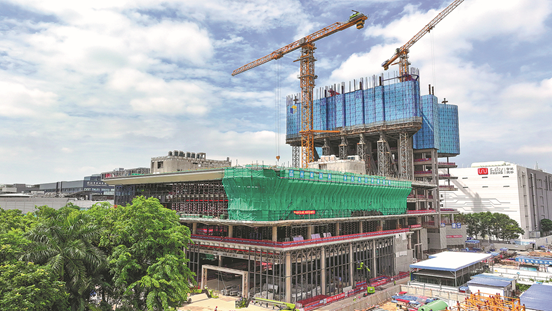By Ken Ip | HK EDITION |
Ken Ip says the 11-city cluster's robust economy, favorable central government policies, and the region's resolve to overcome various challenges will strengthen its potential to be a world innovation powerhouse

A view of the under-construction Shenzhen Park of the Hetao Shenzhen-Hong Kong Science and Technology Innovation Cooperation Zone. [Photo/Xinhua]
The Guangdong-Hong Kong-Macao Greater Bay Area, comprising 11 cities in the Pearl River Delta, has gained significant attention as a potential contender for the title of Silicon Valley 2.0. With a thriving technological landscape and a range of advantages, such as a large population, a strong economy and government support, the GBA has the potential to become a global powerhouse of innovation. However, to fulfill this ambitious vision, the city cluster must address challenges related to intellectual property protection, bureaucracy and talent attraction.
The GBA already boasts an impressive technological landscape, with world-leading companies and a thriving startup ecosystem. Chinese mainland tech giants Huawei, ZTE, Tencent and DJI have set up their headquarters within the region, which has emerged as a hub for innovation, and is witnessing the rise of artificial intelligence unicorns and startups. The region's prominence in electric vehicle production, led by companies like BYD and Xpeng, further solidifies its potential as a technological pivot.
The GBA has several advantages that position it as a promising contender for Silicon Valley 2.0. Its vast and growing population of more than 80 million offers a substantial talent pool and a massive consumer market for technology companies. Additionally, the region's robust economy, with a gross domestic product exceeding 13 trillion yuan ($1.78 trillion), provides a solid foundation for fostering the growth of technological enterprises.
Another compelling aspect of the GBA is its comparatively lower costs. Startups and businesses can benefit from a more affordable cost of living and doing business, enabling them to allocate resources more efficiently. This cost advantage enhances the region's appeal, particularly for entrepreneurs seeking to establish their ventures in a vibrant and promising environment.
The Chinese government's unwavering commitment to the GBA through substantial investments and supportive policies is a significant advantage. These measures give the region access to capital, enable it to foster an environment that's conducive to innovation, and position it as an attractive destination for businesses.
To fulfill its potential as Silicon Valley 2.0, the GBA must address various challenges. Intellectual property protection is of paramount concern, given China's historical weaknesses in this area. Enhancing intellectual property rights and reinforcing mechanisms for their protection will be crucial to instilling confidence among domestic and foreign companies.
Streamlining bureaucracy is another challenge that must be addressed. The Chinese government's commitment to efficiency and agility will play a pivotal role in creating a business-friendly environment that allows technology companies to thrive. By simplifying administrative processes and reducing regulatory burdens, the GBA can encourage innovation and facilitate the growth of startups.
Talent attraction and retention are vital for the GBA to achieve success. While the region possesses a large population, it must actively cultivate an environment that attracts and retains top-tier technology professionals. Investing in education and training programs through government initiatives and private sector collaboration will help develop a skilled workforce capable of driving innovation forward.
An essential aspect of the GBA's success lies in its ability to create an open and inclusive environment. By fostering an atmosphere that welcomes individuals from diverse backgrounds, the region can encourage collaboration and cross-pollination of ideas. Encouraging the free flow of information, promoting cultural exchanges, and supporting entrepreneurship across borders can contribute to a vibrant and inclusive ecosystem.
As part of the GBA, Hong Kong stands to benefit in numerous ways from the region's growth and development. Hong Kong businesses can access the GBA's large and growing market, presenting significant opportunities for expansion. Collaboration with innovative GBA companies allows Hong Kong businesses to tap into expertise, resources and networks, enabling the development of new products and market access. The GBA's pool of talented tech professionals creates opportunities for Hong Kong businesses to recruit skilled workers and foster innovation. Moreover, by leveraging the GBA's status as a major financial center, Hong Kong can access capital from regional investors to support growth strategies. With strong government support in terms of tax breaks, subsidies and other programs, Hong Kong businesses benefit from financial incentives and resources for their growth within the GBA. These advantages will help the SAR to thrive and contribute to the region's technological development.
The GBA has the necessary ingredients to become Silicon Valley 2.0. By addressing various challenges, such as intellectual property protection, bureaucracy and talent attraction, the region can unlock its full potential as a global leader in innovation and technology. With continued government support, collaboration, and a commitment to creating an open and dynamic environment, the GBA can foster a new era of technological excellence. Hong Kong's integration into the GBA further strengthens the region's prospects and provides a platform for its businesses to thrive. By working collaboratively, the GBA has the potential to redefine the global technological landscape.